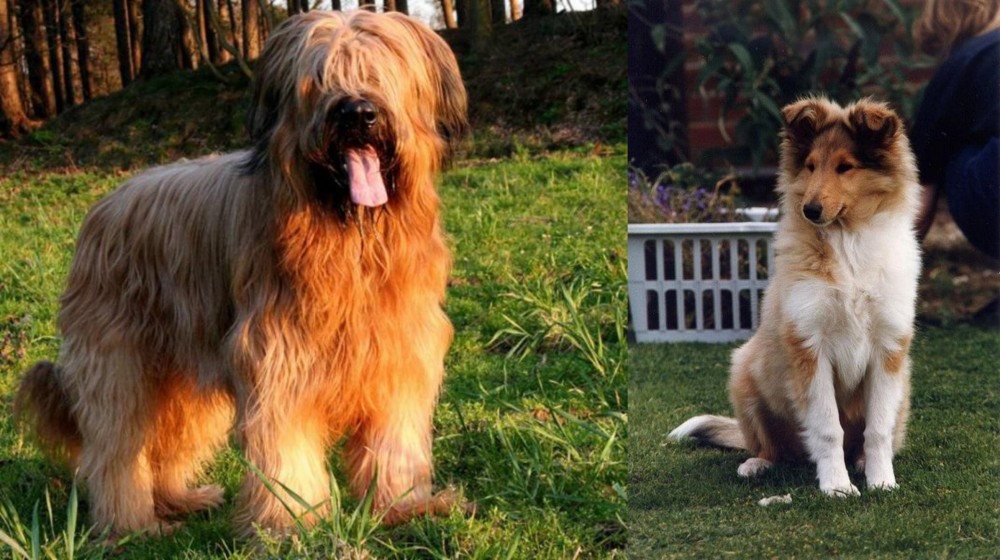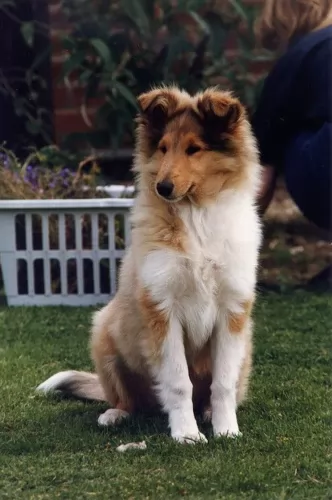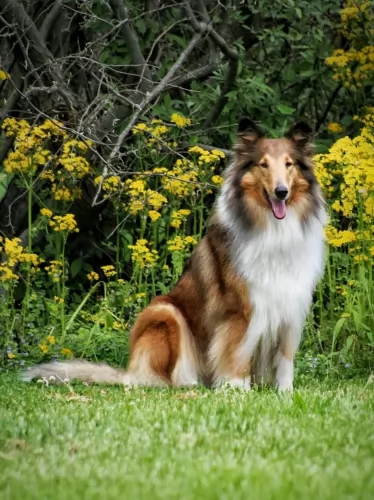 Petzlover
Petzlover Briard is originated from France but Rough Collie is originated from United Kingdom. Briard may grow 8 cm / 4 inches higher than Rough Collie. Briard may weigh 10 kg / 23 pounds more than Rough Collie. Briard may live 3 years less than Rough Collie. Both Briard and Rough Collie has same litter size. Briard requires High Maintenance. But Rough Collie requires Moderate Maintenance
Briard is originated from France but Rough Collie is originated from United Kingdom. Briard may grow 8 cm / 4 inches higher than Rough Collie. Briard may weigh 10 kg / 23 pounds more than Rough Collie. Briard may live 3 years less than Rough Collie. Both Briard and Rough Collie has same litter size. Briard requires High Maintenance. But Rough Collie requires Moderate Maintenance
 Through myth and legend, the Briard is thought to be a very ancient dog. A French herding breed, a Briard type of dog appears in writings as early as the end of the 14th century. According to legends the Briard was owned by Napoleon, Charlemagne, Lafayette and Thomas Jefferson. As a cross between the Barbet and the Beauceron, the Briard came into popularity following its appearance in a Paris dog show in 1863. Bred originally to guard and herd sheep, these intelligent, independent dogs were often left on their own. Because they both guarded and herded, their size and structure as well as their personalities were different from other dogs that worked sheep. Those that herded only were fast, agile and smaller. Those that only guarded were heavier, bigger and stronger. The Briard was in-between these two types of breeds. He was well suited to any kind of farm work and guarded the crops from the sheep’s desire to eat them. They moved the sheep from one grazing area to another and then to their holding area at night. No humans had to assist the Briard in this work once they were trained.
Through myth and legend, the Briard is thought to be a very ancient dog. A French herding breed, a Briard type of dog appears in writings as early as the end of the 14th century. According to legends the Briard was owned by Napoleon, Charlemagne, Lafayette and Thomas Jefferson. As a cross between the Barbet and the Beauceron, the Briard came into popularity following its appearance in a Paris dog show in 1863. Bred originally to guard and herd sheep, these intelligent, independent dogs were often left on their own. Because they both guarded and herded, their size and structure as well as their personalities were different from other dogs that worked sheep. Those that herded only were fast, agile and smaller. Those that only guarded were heavier, bigger and stronger. The Briard was in-between these two types of breeds. He was well suited to any kind of farm work and guarded the crops from the sheep’s desire to eat them. They moved the sheep from one grazing area to another and then to their holding area at night. No humans had to assist the Briard in this work once they were trained.
During World War 1, the Briards were drafted into service as messengers, sentries and search dogs for lost or injured soldiers. In that time frame the breed served almost to the point of extinction. Breeding programs following the war brought them back. Today the Briard is a home companion, a police dog, as well as both military and civilian search and rescue dogs.
 Many people have seen the movie ‘Lassie’, and of course this movie made the Collie popular and famous.
Many people have seen the movie ‘Lassie’, and of course this movie made the Collie popular and famous.
Apart from the Rough Collie, you also get the Smooth Collie. The Rough Collie’s origins start in the 1800’s in Scotland and Wales but unfortunately, the Rough Collie's exact origins are shrouded in lack of information.
These dogs were used as herding dogs in real-life and in movies, and it was in 1879 that the first English Rough Collie was imported to the USA, but it is the UK from whence the dog comes.
 The Briard is a powerful, intelligent and independent working dog. They have a straight topline and their height is almost the same as their length. They have long, large, rectangular heads with wide muzzles. Their noses are also square and jet black while their side set, large eyes can be black-brown or black. Their ears have traditionally been cropped but with more countries outlawing it, they can now have natural ears set high on the head. They have a tail that is feathered and low-cut. The feet of a Briard are round, compact and large.
The Briard is a powerful, intelligent and independent working dog. They have a straight topline and their height is almost the same as their length. They have long, large, rectangular heads with wide muzzles. Their noses are also square and jet black while their side set, large eyes can be black-brown or black. Their ears have traditionally been cropped but with more countries outlawing it, they can now have natural ears set high on the head. They have a tail that is feathered and low-cut. The feet of a Briard are round, compact and large.
The Briard is a double coated breed with a long beard and mustache. Their hair completely covers the head and the eyes so that they are not seen. They have prominent eyebrows as well.
 The Rough Collie or Long-haired Collie is considered to be a medium to large sized dog with a long, double-layer coat.You’ll find the coat mainly as tri-colored – white, fawn and dark brown and black.
The Rough Collie or Long-haired Collie is considered to be a medium to large sized dog with a long, double-layer coat.You’ll find the coat mainly as tri-colored – white, fawn and dark brown and black.
The Rough Collie stands at between 51 to 61cm in height and weighs between 18 and 30kg. The long, thin muzzled dog has semi erect, semi-floppy ears, sweet, gentle eyes and a long, plumed tail.
Rough collies are loving, gentle dogs who thrive on spending time with their human families. Their kindly nature makes them good therapy dogs.They don’t do well when left in the back yard on their own day after day. They’re social dogs who love playing with the children in the home and they get on well with other family pets.
The Rough Collie is highly intelligent and he is easy to train. With training and socialization he becomes so well behaved you can take him anywhere.
 As mentioned previously the Briard is intelligent and independent. They are also loyal, rugged, protective and bond intensely with their humans. They are often aloof when it comes to strangers or even when new furniture is introduced into the household. They have to learn that anything new into the family environment is friendly and good. They are great with children and susceptible to separation anxiety because of their deep affection for their people. Socialization for puppies is a must. This will let them know that people and children, other dogs in general are not harmful to their families. They have great memories and once they learn something – right or wrong – it is almost impossible to change it. They were bred to be independent thinkers who acted on their own conclusions. This is still true of the breed today, making them appear to be stubborn.
As mentioned previously the Briard is intelligent and independent. They are also loyal, rugged, protective and bond intensely with their humans. They are often aloof when it comes to strangers or even when new furniture is introduced into the household. They have to learn that anything new into the family environment is friendly and good. They are great with children and susceptible to separation anxiety because of their deep affection for their people. Socialization for puppies is a must. This will let them know that people and children, other dogs in general are not harmful to their families. They have great memories and once they learn something – right or wrong – it is almost impossible to change it. They were bred to be independent thinkers who acted on their own conclusions. This is still true of the breed today, making them appear to be stubborn.
They are great watchdogs, fearless and brave; willing to learn, eager to make you happy. They are basically gentle but that always runs up against their protective nature. A strong alpha leader is needed to handle this hard-working dog.
 The Rough Collie is such an intelligent dog, but he is loving and devoted too. He can slot into life in the city or countryside because all he really wants is to be close to his human family.
The Rough Collie is such an intelligent dog, but he is loving and devoted too. He can slot into life in the city or countryside because all he really wants is to be close to his human family.
Wherever you live with your Rough Collie though, he will need to be well exercised. He is sweet but slightly timid and will want to be with a family that isn't too noisy in terms of lots of shouting.
People who have had Collies say these dogs make he most awesome pets, and in the right environment these wonderful intelligent dogs will make splendidly loyal, loving pets and companions,
 Being a large breed, the Briard shares many of the same health concerns as other large breeds. They have a few of their own as well. Typical issues for a Briard might include:
Being a large breed, the Briard shares many of the same health concerns as other large breeds. They have a few of their own as well. Typical issues for a Briard might include:
Progressive Retinal Atrophy/Degeneration –degeneration of the photoreceptors and retina.
 The Rough Collie can reach 12 to 14 years of age with good care. There are always some health issues to be aware of such as hereditary eye diseases. Also, as with most larger breeds, hip dysplasia is always a concern.
The Rough Collie can reach 12 to 14 years of age with good care. There are always some health issues to be aware of such as hereditary eye diseases. Also, as with most larger breeds, hip dysplasia is always a concern.
Other illnesses to look out for include cancer, skin allergies, bloat and Grey Collie Syndrome. As a responsible dog owner, get your pet to the doctor when you notice a change in his behavior – tiredness, vomiting, lethargy, unusual lumps, swelling and a feeling of depression.
This is a form of canine cyclic neutropenia which affects the Collie breed. There is a low concentration of neutrophils in the blood. It can be hereditary or it can develop because of a side effect of chemotherapy for instance. It is essentially caused by a defect in the bone marrow stem cells. Affected dog will always battle with gastrointestinal problems and infections of the eye.The life expectancy of a Collie with this ailment will be less than 3 years.
 It is best to feed the Briard smaller meals 2-3 times a day to prevent bloat. Feed 3-4 cups total for the day of a dry dog food that is high quality and made for large breeds.
It is best to feed the Briard smaller meals 2-3 times a day to prevent bloat. Feed 3-4 cups total for the day of a dry dog food that is high quality and made for large breeds.
Stationary Night Blindness – Congenital limited vision in the dark can vary from slight difficulty moving to complete inability to see in the dark.
Progressive Retinal Atrophy/Degeneration – Can lead to night blindness, limited or total blindness. Puppies with the disease can be blind before their first birthday.
Bloat (Gastric Torsion) – Stomach is distended and twists. Fatal if not treated quickly. Caused by eating a large meal quickly and either exercise immediately or drink a large amount of water right after eating.
Von Willebrand’s Disease – Blood clotting disorder leads to excessive bleeding. There is no cure, but it is manageable.
The Briard is a working dog and as such needs a job. They excel at agility, flyball, herding, obedience, confirmation and tracking. They need exercise and make excellent service dogs for people with disabilities and therapy dogs for those in emotional need.
 Your Rough Collie does shed so he will require a good brush twice a week. The long silky hair can matt so this grooming session will be important.
Your Rough Collie does shed so he will require a good brush twice a week. The long silky hair can matt so this grooming session will be important.
Your film-star collie is an active, athletic dog. He has always been used to herding sheep, and instinctively he wants to be active. His bright eyes are always alert to some action, and his exercise needs go beyond just allowing him to run around in your back yard.
He is the kind of dog that wants something more energetic such as going on hikes or long walks and running after sticks or balls on the beach.
A Collie is an energetic dog and will require the best dog food there is. If you give him commercially manufactured food make sure it is the right food for his size, his breed and his energy levels.
To add some variety, feed him some home-made food occasionally which can be added to his dry kibble twice a week. Boiled chicken, brown rice or pasta and spinach, sweet potatoes and carrots are a healthy choice for your pet. Try and feed him some raw meat occasionally. Ensure there is always a bowl of fresh, cool water for him.